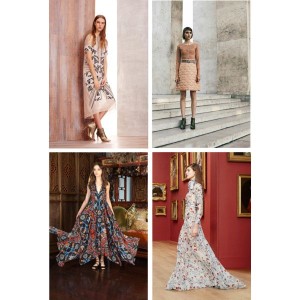
I often get asked, “How do I begin shopping ethically?” which I always counter with another question, “Well, what matters most to you?”
Ethical shopping is complex. The more you learn about where clothes come from and how they are made, the more you may get dismayed and overwhelmed. Still not convinced? Read about ethical burnout. It’s a real phenomenon, and one that I can say has some nasty repercussions. For me, it was a main course of antisocial behavior followed by a dessert of cynicism.
I don’t want this to happen to you! That’s why it’s so important to get specific about your ethical priorities and not boil the ocean and try to tackle every ethical dilemma when you shop.
My friend Leah Wise put together a thoughtful list of 5 ethical priorites to consider as a starting point. You can use it to help determine which points you value most and find the brands that align with them.
Below is a consolidated version of Leah’s post. For the full article, visit StyleWise. I’ve also added a few of my favorite brands and have noted where I made these additions.
A Guest Post by Leah Wise
1. Overall Sustainability
Obviously, companies that take a measured, holistic approach to ethical business are my top pick. That means that they take the long view, ensuring worker welfare; creating innovative initiatives that build lasting infrastructure; treating all workers as equal partners in long term growth; creating high quality, marketable designs; and using and/or developing environmentally sustainable processes, textiles, sustainable ecommerce, and everything in between.
Numi Tea does this extraordinarily well, as do Tonle and ZADY, though Eileen Fisher may represent the pinnacle of this responsible, thoughtful business model.
Adds From Kasi
I also respect Ecoalf, Reve En Vert (marketplace) and Patagonia in this space.
2. Fair Trade Labor Practices
People should not be treated like slaves. Other than the fact that it should inherently be something we’re opposed to, it’s also bad business practice. Downtrodden people have a hard time innovating. Overworked people have a hard time building lives for themselves and their children that will improve local infrastructure and lift communities and countries out of corruption and poverty. We may not be able to sway leaders in countries where the most dangerous sweatshops are housed, but we can say we aren’t okay with allowing some people to get virtually no share of the prosperity good business should bring about..
Krochet Kids, Elegantees, Mata Traders, Equal Exchange, and Ten Thousand Villages are exemplars of the fair trade movement.
Adds From Kasi
I have to mention People Tree here too. They were one of the original pioneers of wearable, fair trade fashion.
3. Dedication to Environmentally Sound Practices
Just because it’s fair doesn’t mean it has our ecosystems’ best interests in mind. Nearly all commercial dyes used in the clothing industry are toxic, so even if factories are properly ventilated, there’s the question of how byproducts are disposed of. Somewhere down the line, someone or something gets hurt. I applaud those companies that have switched over to organic cotton, but cotton is a thirsty crop and, in some ways, that makes it inefficient. Companies that use safely processed bamboo and eucalyptus fibers, repurposed textiles, and factory remnants offer a better alternative. Even better when they use recycled packaging and renewable energy at their factories.
Amour Vert, Naja, Dorsu, and PACT are great examples of this point of view.
Adds From Kasi
+ Reformation for their use of surplus and eco-consious materials like Tencel.
4. Made locally or benefits local culture and economy
Sometimes you just want to celebrate local artists! I’ve eased up a bit on my scrutinizing gaze when it comes to local artisan work and products from local, small scale boutiques. While perfect production standards are an important goal, I think that the key to getting more people on board with conscious consumerism is letting them see the quality of artisan products up close, so supporting small businesses that allow that to happen is key. Items from small scale designers and craftspeople were likely crafted with what we’d consider fair labor practices, but materials sourcing is often murky. Occasionally, local designers will outsource some of their production, but the great thing is that you can actually have a conversation with them about it and figure out why.
Adds From Kasi
5. Messaging with the potential to lead industry change
This bullet point is really about Everlane. Everlane has transparent pricing and used to be pretty good about letting you into their factory practices. I think they’ve lost some of that accessibility as they’ve scaled. They also don’t share a lot about their textiles or raw materials sourcing. But because of their incredible success, they’ve encouraged a lot more companies and consumers to consider and start to dismantle the fast fashion industry. Because of companies like Everlane, people are beginning to demand quality products sold with pricing transparency. In many ways, it’s given some amount of power back to the people. As long as we keep asking questions, we’re on our way to growing the ranks.
I should also mention TOMS and Warby Parker as companies that start the conversation without fully committing to sustainability. Maybe we can work together to push them toward it.
Adds From Kasi
I’d say the same goes for H&M. They are ahead of other fast fashion brands on investing in fashion innovation (here) and spreading the message about sustainability to the masses, but they don’t always implement these practices in their own business (here), often resulting in egregious greenwashing. Talk about a double edge sword.
Though this list was written in hierarchical order, I prioritize progress over perfection. Sometimes good design wins the day over the best ethical credentials. Sometimes a company is so innovative in one way that I believe they deserve support, even if they aren’t completely with it in every way. And I believe that it’s up to the individual consumer to create their own set of standards within the broader umbrella of conscious consumerism.
Conversations with people who don’t quite agree with me is what has led me to my current list. It’s broadened my view on some points and hyper-focused it on others.
Tell Leah what you prioritize in the comments and read the her full post here.
Photo: Cuyana



